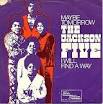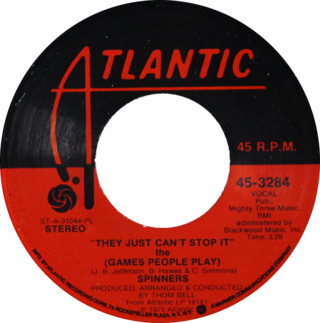Anthony H. Forté, better known by his stage name Rappin' 4-Tay, is an American rapper from San Francisco, California.

The Trammps are an American disco and soul band, who were based in Philadelphia and were one of the first disco bands.

The Spinners are an American rhythm and blues vocal group that formed in Ferndale, Michigan, in 1954. They enjoyed a string of hit singles and albums during the 1960s and 1970s, particularly with producer Thom Bell. The group continues to tour, without any original members, after Henry Fambrough retired in 2023.

"TSOP (The Sound of Philadelphia)" is a 1974 recording by MFSB featuring vocals by The Three Degrees. It was written by Gamble and Huff as the theme for the American musical television program Soul Train, which specialized in African American musical performers. The single was released on the Philadelphia International Records label. It was the first television theme song to reach No. 1 on the Billboard Hot 100.

"Maybe Tomorrow" is a hit single recorded by American soul family quintet the Jackson 5, in 1971. "Maybe Tomorrow" was included on the Jackson 5's album of the same title, and was also featured on Goin' Back to Indiana. The song was released again in 2009 via a Carl Sturken and Evan Rogers' remix, with an orchestral arrangement by Rob Mounsey, from a compilation album The Remix Suite.

"Shop Around" is a song originally recorded by the Miracles on Motown Records' Tamla subsidiary label. It was written by Miracles lead singer Smokey Robinson and Motown Records founder Berry Gordy. It became a smash hit in 1960 when originally recorded by the Miracles, reaching number one on the Billboard R&B chart, number one on the Cashbox Top 100 Pop Chart, and number two on the Billboard Hot 100 chart. It was the Miracles' first million-selling hit record, and the first-million-selling hit for the Motown Record Corporation.

Spinners is the third studio album recorded by American R&B group The Spinners, produced by Thom Bell and released in April 1973 on the Atlantic label. The album was the group's first for Atlantic after leaving Motown.

"Love Train" is a hit single by the O'Jays, written by Kenny Gamble and Leon Huff. Released in 1972, it reached No. 1 on both the R&B Singles and the Billboard Hot 100 in February and March 1973 respectively, and No. 9 on the UK Singles Chart and was certified gold by the RIAA. It was the O'Jays' first and only number one record on the US pop chart. The song has been considered one of the first songs of disco music.
"How Could I Let You Get Away" is a song recorded by the American vocal group The Spinners. Produced by Thom Bell and recorded at Philly's Sigma Sound Studios, the lush, string-augmented production of the song drew comparisons to another Bell - produced group, The Stylistics. The song was recorded for inclusion on the group's 1972 self-titled debut album on Atlantic Records. It was also the A-side of the group's first single release on Atlantic in July 1972. It was the first Spinners hit to feature lead vocals by Philippé Wynne. The song had modest success on the charts, reaching number fourteen on the U.S. R&B charts and crossing over to the U.S. Pop charts peaking at number seventy seven. However, it would be the single's B-side, "I'll Be Around" led by the Spinners' other lead singer Bobby Smith, that would be the group's real chart breakthrough, becoming a #1 R&B and #3 pop hit in the fall of 1972 and eventually reaching sales of over a million copies.

"Could It Be I'm Falling in Love" is a 1972 song recorded by the American R&B vocal group The Spinners. It was co-written by Melvin and Mervin Steals, two songwriter brothers working for Atlantic, who were sometimes credited as "Mystro and Lyric." It was produced by Thom Bell, recorded at Philadelphia's Sigma Sound Studios and the house band MFSB provided the backing. Bobby Smith sings lead through most of the song, while Philippé Wynne handles vocal duties on the outro.

Don't Fight the Feelin' is the second studio album by American rapper Rappin' 4-Tay from San Francisco, California. It was released on July 26, 1994 via Chrysalis Records and Rag Top Records. Recording session took place at Graffiti Tunez in West Oakland, at Buck Fifty Records, at Bay View Productions, at Sucka Free City and at JT's in the Mo. Production was handled by Ant Banks, Black C of RBL Posse, Cyrus Esteban, Gigolo G, J-Mack, JT the Bigga Figga, Lil' Fly, T.C., and Franky J, who also served as executive producer. The album features guest appearances from fellow San Francisco-based rappers JT the Bigga Figga, Lil' Fly and Seff tha Gaffla.

"One of a Kind (Love Affair)" is a song recorded by the American R&B vocal group The Spinners (known as "Detroit Spinners" in the UK). It was written by Joseph B. Jefferson and produced by Thom Bell.
"Mighty Love" is a 1973 song recorded by the American R&B vocal group The Spinners. The song was co-written by Joseph B. Jefferson, Bruce Hawes and Charles Simmons and was produced by Thom Bell.

"Games People Play", also known as "'They Just Can't Stop It' The ", is a song recorded by American R&B vocal group The Spinners. Released in 1975 from their Pick of the Litter album, featuring lead vocals by Bobby Smith, it was a crossover success, spending a week at number one on the US Hot Soul Singles chart and peaking at number five on the Billboard Hot 100. Recorded at Philadelphia's Sigma Sound Studios, the house band MFSB provided the backing. Female backing vocals on the song were performed by Carla L. Benson, Evette Benton, and Barbara Ingram, who together formed the legendary studio backing vocal group Sweethearts of Sigma. The female lead vocal on the track is by Evette Benton. This song was an RIAA-certified million seller for the Spinners.

"You Make Me Feel Brand New" is a 1974 single by the Philadelphia soul group The Stylistics. An R&B ballad, the song was written by Thom Bell and Linda Creed.

"Thin Line Between Love and Hate" is the title of a 1971 song by the New York City-based R&B vocal group The Persuaders. The song was written and produced by the Poindexter brothers, Robert and Richard, and was also co-written by Robert's wife, Jackie Members.

"Hi-Jack" is a 1974 r&b and funk disco based song written by Spanish musician Fernando Arbex and originally recorded by his group Barrabás for their album ¡Soltad a Barrabás!. While their version of the song was a huge success in their native Spain, going all the way to Number one over there, the song flopped in America, stalling at just number No. 104 on the Bubbling Under the Billboard Hot 100 Charts in July 1975. It was later a hit single for jazz flautist Herbie Mann.

Happiness Is Being with the Spinners is the seventh studio album recorded by American R&B group The Spinners, released in July 1976 on the Atlantic label. It was produced by Thom Bell and recorded at Sigma Sound Studios in Philadelphia and Kaye-Smith Studios in Seattle.

"I'll Be Around" is the second single released from American rapper Rappin' 4-Tay's second album, Don't Fight the Feelin' (1994). The song both samples the music and retains the original chorus of the Spinners' song of the same name, though Rappin' 4-Tay replaced the song's original lyrics with his own. The Spinners were credited as featured artists, and songwriters Thom Bell and Phil Hurtt were both given writing credits.
"Sadie" is a song recorded by the American R&B vocal group The Spinners. The song was written and produced by Joseph B. Jefferson, Bruce Hawes and Charles Simmons. Recorded at Philly's Sigma Sound Studios and released as the third single from their 1974 New and Improved album on Atlantic Records, "Sadie" would chart at number #7 on the U.S. R&B Singles Chart, their 10th consecutive Top 10 Atlantic single on the chart. It also reached the number #54 position on Billboard Pop Singles chart.
















